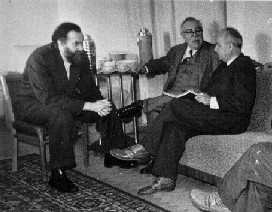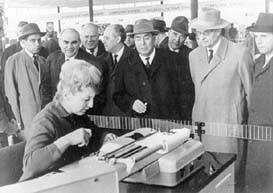
Slava
Gerovitch,
From Newspeak to Cyberspeak: A History of Soviet Cybernetics
(MIT
Press, 2002)

Japanese edition (University of Nagoya Press, 2023)
Award
In November 2003, From Newspeak to Cyberspeak received an honorable mention from the Wayne S. Vucinich Book Prize committee of the American Association for the Advancement of Slavic Studies for an outstanding monograph in Russian, Eurasian, or East European studies. Gerovitch's book "offers a scientifically-informed, sociologically-acute and politically-savvy account of cybernetics in the Soviet Union in the post war era, but also moves beyond to an impressive comparison with developments in the United States," wrote the Prize committee in its citation.

Aleksei Liapunov, Norbert Wiener and Gleb Frank, Moscow, 1960
Endorsements
"An exceptionally lively and interesting book. This is by far the best-informed and most insightful account of cybernetics in the Soviet
Union."
-- David Holloway, Raymond A. Spruance Professor of International History, Stanford University
"Cybernetics was among the most important intellectual movements of the mid-twentieth century. Nowhere was its curious blend of mathematical technique, ideology, information technology, and postmodern scientific universalism more controversial or more interesting, than in the Soviet Union during the early Cold War. Slava Gerovitch is among the first scholars to command the linguistic skills, cultural resources, and historical awareness to offer a definitive account. From Newspeak to Cyberspeak not only sheds new light on the byzantine intellectual world of the Soviet Union, but holds up a fascinating mirror to the West as well. This is a groundbreaking achievement that deserves a wide
audience."
-- Paul N. Edwards, Director, Science, Technology and Society Program, University of Michigan

Aleksei Liapunov presents his project of the "cybernetization" of Soviet science
Reviews
- Benjamin Nathans in Journal of Modern History
- Paul Josephson in Mathematical Intelligencer
- Harley Balzer in American Historical Review
- Christine Leuenberger in American Journal of Sociology
- David J. Clark in British Journal for the History of Science
- Nathan M. Brooks in Choice
- David A. Dyker in Europe-Asia Studies
- Klaus Galensa in Computing Reviews
- Paolo G. Cordone in First Monday
- Peter Wolcott in IEEE Annals of the History of Computing
- Chris Bissell in IEEE Control Systems Magazine
- Joselle L. Merritt-Dennis in Journal of the Association for History and Computing
- Robert Campbell in Journal of Cold War Studies
- Philip Mirowski in Journal of Economic Literature
- Andrew Pickering in Metascience
- Mark Harrison in The Russian Review
- Laurie M. Haines in History of Education Quarterly
- Philip J. Davis in Society for Industrial and Applied Mathematics News
- Yu Koizumi in Yomiuri Shimbun (Japanese edition)

Party leaders Leonid Brezhnev and Mikhail Suslov view the latest model of the MIR-1 computer
In this book, Slava Gerovitch argues that Soviet cybernetics was not just an intellectual trend but a social movement for radical reform in science and society as a whole. Followers of cybernetics viewed computer simulation as a universal method of problem solving and the language of cybernetics as a language of objectivity and truth. With this new objectivity, they challenged the existing order of things in economics and politics as well as in science.
The history of Soviet cybernetics followed a curious arc. In the 1950s it was labeled a reactionary pseudoscience and a weapon of imperialist ideology. With the arrival of Khrushchev's political "thaw," however, it was seen as an innocent victim of political oppression, and it evolved into a movement for radical reform of the Stalinist system of science. In the early 1960s it was hailed as "science in the service of communism," but by the end of the decade it had turned into a shallow fashionable trend. Using extensive new archival materials, Gerovitch argues that these fluctuating attitudes reflected profound changes in scientific language and research methodology across disciplines, in power relations within the scientific community, and in the political role of scientists and engineers in Soviet society. His detailed analysis of scientific discourse shows how the Newspeak of the late Stalinist period and the Cyberspeak that challenged it eventually blended into
"CyberNewspeak."
Engineers Lev Dashevskii (right) and Solomon Pogrebinskii at the MESM, the first Soviet electronic digital computer
Introduction. Soviet Science and Politics Through the Prism of Language
Chapter 1. The Cold War in Code Words: The Newspeak of Soviet Science
- Balancing Military and Ideological Priorities for Cold War Science
- Shifting Boundaries Between Knowledge and Ideology
- Newspeak: The Fundamentals
- Scientific Newspeak
- "Formalism" as a Floating Signifier
- From Formulae to "Formalism" in Mathematics
- From Literary Form to "Formalism" in Linguistics
- The Specter of "Idealism" in Physiology
- Norbert Wiener and Andrei Kolmogorov: Two Mathematicians Tackle Biology
- Control via Feedback: The Body as a Servomechanism
- The Order of Life: The Organism as an Entropy-Reducing Machine
- Human Communication as an Engineering Problem: Man as an "Information Source"
- The Computer and the Mind as Universal Logical Machines
- The Logic of the Brain: The Nervous System as a Turing Machine
- The Computer as a Brain and the Brain as a Computer
- The Making of Cyberspeak and the Emergence of Cybernetics
- Cyberspeak Becomes Universal
- The Cybernetics Bandwagon
- Cybernetic Ideas in a Soviet Context: Pro and Contra
- "Russian Scandal" at the Root of Cybernetics
- Postwar Ideological Campaigns as Rituals
- The Cybernetics "Scandal"
- Serial Reproduction of Criticism
- Computers as "Mathematical Machines" of the Cold War
- The Military Definition of Computing: Technology Without Ideology
- Soviet Computers: A State Secret or a "Display Technology"?
- Soviet Science in Search of a New Language
- Soviet Computers: Declassified and Deified
- The Computer as a Paragon of Objectivity
- Soviet Philosophy Between Scylla and Charybdis
- The Newspeak Defense of Cybernetics
- The Military Defense of Cybernetics
- Cyberspeak Challenges Newspeak
- Cybernetics and Genetics: A Common Cause
- Cybernetics Challenges Soviet Philosophy
- The Legitimation of Cybernetics
- Cybernetics as a "Trading Zone"
- The Council on Cybernetics as an Institutional "Umbrella"
- Biological Cybernetics: Genes as "Units of Hereditary Information"
- The Mathematical "Axioms of Life"
- Physiological Cybernetics: The Brain as a Subject of Technology
- "Man is the Most Perfect of All Known Cybernetic Machines…"
- Cybernetic Linguistics: Making the Study of Language an "Exact Science"
- From Machine Translation to Linguistic Theory
- The Fate of the Institute of Cybernetics
- "What is Cybernetics?"
- "Cybernetics in the Service of Communism"
- The "Dialectical Materialization" of Cybernetics
- Cybernetics in Fashion
- From "Military Cybernetics" to "Economic Cybernetics"
- "Optimal Decision-Making on a National Scale": Aspirations and Constraints
- "Optimal Planning": A Vehicle of Economic Reform or an Obstacle to It?
- Cybernetics in the Service of the Establishment
- CyberNewspeak: The "Scientific Management of Society"
- The End of the Cybernetics Game
- Cyberspeak as a Carnival Language
- Cyberspeak as an Instrument of Freedom
- Cyberspeak as a Universal Language of Capitalism and Communism
Booksellers